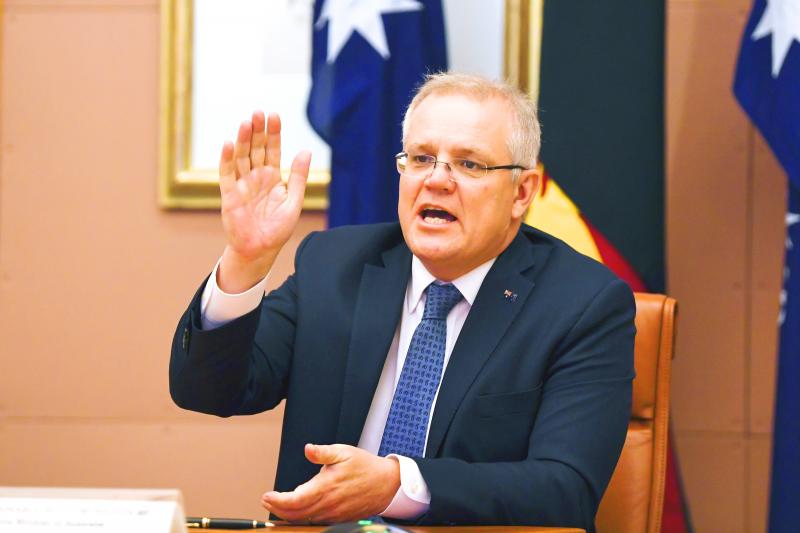Australian Prime Minister Scott Morrison yesterday said that his government held a less dramatic view of US-China strategic tensions than a predecessor who warned of a potential “hot war” before the US presidential election in November.
Former Australian prime minister and China academic Kevin Rudd wrote in Foreign Affairs this week that the risk of armed conflict between the US and China in the next three months was “especially high.”
Morrison said his administration had expressed similar views in a defense policy update last month.

Photo: EPA-EFE
“Our defense update expresses it differently and certainly not as dramatically as Kevin, but in our own defense update, we’ve acknowledged that what was previously inconceivable and not considered even possible or likely in terms of those types of outcomes is not considered in those contexts anymore,” Morrison told the Aspen Security Forum in an online address from the Australian capital, Canberra.
Meanwhile, Australian federal police raided the home and office of a man employed by an Australian politician as part of a foreign interference investigation into whether he was working to advance “Chinese state interests,” court documents showed.
The disclosure is made in documents lodged on Monday in Australia’s High Court by the employee, John Zhang (張智森), who is seeking to quash the search warrants used by police and the return of seized computer evidence.
Zhang, who could not be reached for comment, has not been charged with any offense.
His lawyers did not immediately respond to requests for comment yesterday.
The documents said that Zhang is an Australian citizen who migrated from China in 1989 and had been employed by New South Wales state politician Shaoquett Moselmane since 2018.
Moselmane, who has been suspended from the NSW Labor party following the raids, has previously said he had not done anything wrong and was not a suspect.
According to details of the search warrants described in the court documents, Zhang was under investigation for allegedly concealing from Moselmane that he was acting on behalf of, or in collaboration with, the “Chinese state and party apparatus including the Ministry of State Security and the United Front Work Department.”
The documents said it was alleged that Zhang was suspected of acting on behalf of the “Chinese state and party apparatus” in a private social media chat group with Moselmane to advance the policy goals of the Chinese government.
He is alleged to have encouraged Moselmane to advocate for “Chinese state interests”, they said.

The Central Election Commission has amended election and recall regulations to require elected office candidates to provide proof that they have no Chinese citizenship, a Cabinet report said. The commission on Oct. 29 last year revised the Measures for the Permission of Family-based Residence, Long-term Residence and Settlement of People from the Mainland Area in the Taiwan Area (大陸地區人民在台灣地區依親居留長期居留或定居許可辦法), the Executive Yuan said in a report it submitted to the legislature for review. The revision requires Chinese citizens applying for permanent residency to submit notarial documents showing that they have lost their Chinese household record and have renounced — or have never

A magnitude 5.6 earthquake struck off the coast of Yilan County at 12:37pm today, with clear shaking felt across much of northern Taiwan. There were no immediate reports of damage. The epicenter of the quake was 16.9km east-southeast of Yilan County Hall offshore at a depth of 66.8km, Central Weather Administration (CWA) data showed. The maximum intensity registered at a 4 in Yilan County’s Nanao Township (南澳) on Taiwan’s seven-tier scale. Other parts of Yilan, as well as certain areas of Hualien County, Taipei, New Taipei City, Taoyuan, Hsinchu County, Taichung and Miaoli County, recorded intensities of 3. Residents of Yilan County and Taipei received

Taiwan has secured another breakthrough in fruit exports, with jujubes, dragon fruit and lychees approved for shipment to the EU, the Ministry of Agriculture said yesterday. The Animal and Plant Health Inspection Agency on Thursday received formal notification of the approval from the EU, the ministry said, adding that the decision was expected to expand Taiwanese fruit producers’ access to high-end European markets. Taiwan exported 126 tonnes of lychees last year, valued at US$1.48 million, with Japan accounting for 102 tonnes. Other export destinations included New Zealand, Hong Kong, the US and Australia, ministry data showed. Jujube exports totaled 103 tonnes, valued at

BIG SPENDERS: Foreign investors bought the most Taiwan equities since 2005, signaling confidence that an AI boom would continue to benefit chipmakers Taiwan Semiconductor Manufacturing Co’s (TSMC, 台積電) market capitalization swelled to US$2 trillion for the first time following a 4.25 percent rally in its American depositary receipts (ADR) overnight, putting the world’s biggest contract chipmaker sixth on the list of the world’s biggest companies by market capitalization, just behind Amazon.com Inc. The site CompaniesMarketcap.com ranked TSMC ahead of Saudi Aramco and Meta Platforms Inc. The Taiwanese company’s ADRs on Tuesday surged to US$385.75 on the New York Stock Exchange, as strong demand for artificial intelligence (AI) applications led to chip supply constraints and boost revenue growth to record-breaking levels. Each TSMC ADR represents